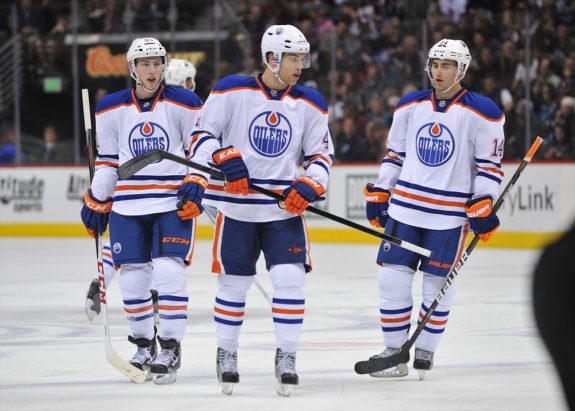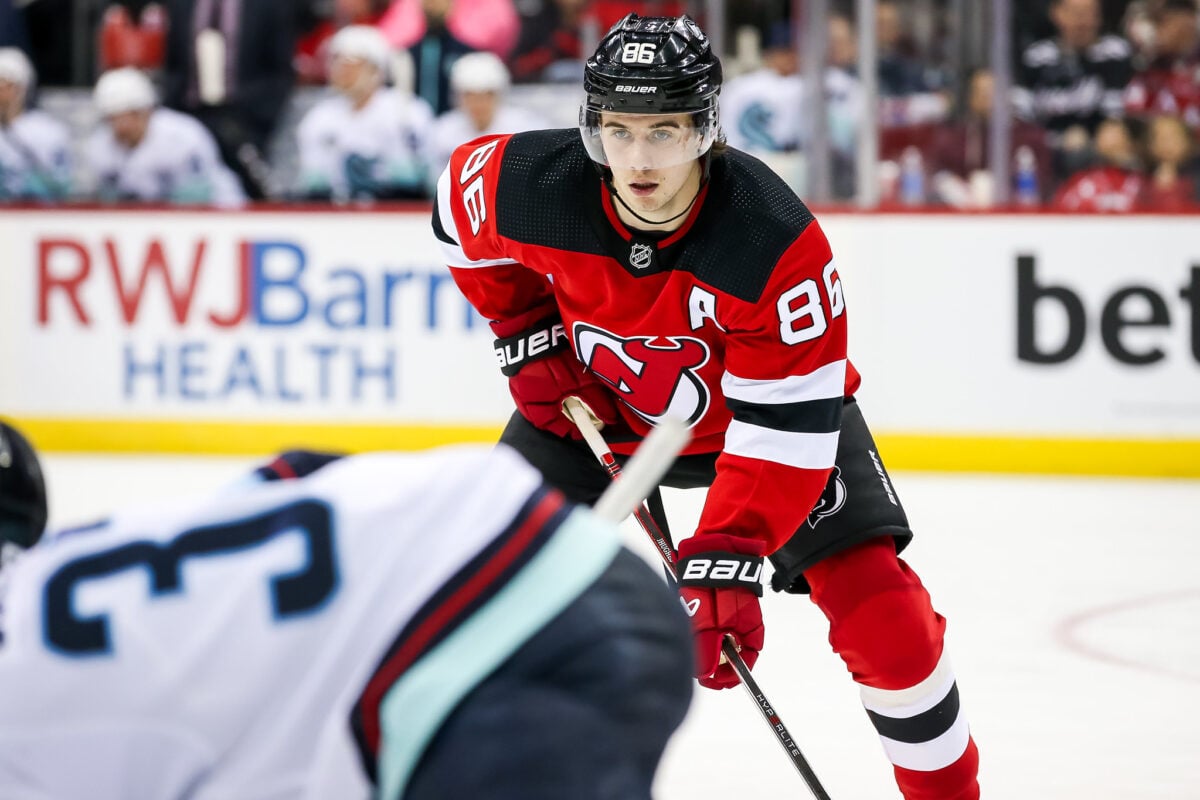Sometimes I can be a curmudgeon, especially when it comes to the “youths.” Sure, I am only 27, but I am nearly a decade removed from high school so I tell myself I have some claim to be one. I am not saying I am right to behave like this. I am just trying to be honest. And in that vein of honesty, nothing brings out my curmudgeon-ness like discussing the young players in the NHL.
Nowadays, the NHL is full of young players doing electrifying, never-before-seen things on the ice. Whether it is creative ways to score, pass, skate, or celebrate, excitement about the talent in the league is palpable. The NHL is their oyster, and the large paydays they secure prove that.
Typically, in my curmudgeon-ness, I would begrudge the attention and hype these kids demand—probably relying on some line like, “They need to earn it,” to justify my crankiness (again, I am not saying I am right). But recently, I listened to Jack Michaels, the play-by-play announcer for the Edmonton Oilers, on Spittin’ Chiclets, and he said something that caught my attention and prompted me to set aside my somewhat unfounded prejudice toward young NHLers.
Discussing the years after the Oilers drafted Ryan Nugent-Hopkins first overall, Michaels said, “It was ugly back then for those young Oiler teams. They just didn’t have the muscle, they didn’t have the veteran guile, that obviously all of a sudden the Oilers today are the oldest team in the league.”

Michaels is describing how the Oilers have aged, right before our eyes seemingly, into a Stanley Cup contender. No matter how much raw skill the team had, some missing components prevented them from beating the juggernauts of that era.
Those missing ingredients were age and experience.
How Michaels framed the Oilers’ development made me wonder about the average age of NHL teams when they win the Stanley Cup. Then (after I told my curmudgeon-ness to be quiet) I wondered whether teams loaded with “young guns” win championships. Finally, I thought, “Can we predict the next Stanley Cup champion based on the team’s average age?”
Those three questions are what we will be exploring. Hopefully, along the way, I can learn to look past my crankiness, and maybe, just maybe, we can all learn something about ourselves, or a least our favorite teams.
Defining our Terms
Before we dive into the numbers, let us define our terms. A “young” player will be anyone 24 and under. Twenty-four provides a reasonable tethering point for players of different calibers. A phenom like Connor Bedard will be in the NHL for six years at the age of 24, but no one would consider him old at that point. Other players who do not break into the NHL until the age of 21 or 22 will still have two or three years under their belts at 24. Again, with such little experience, these players can hardly be considered old.
Anyone over 25 is straight-up old. I mean old as dirt. I am kidding of course, but I like 25 as the benchmark for “old” players because players will have had some NHL experience by that age and will really begin to enter the prime of their careers (think of Nathan MacKinnon who really has elevated his game the past few years).
To determine the average age of a team, we are using Hockey Reference and looking at the age of the Stanley Cup champions on Feb. 1 of the regular season and the average age of their roster in the playoffs. Having both is important because it shows how the team made it into the playoffs and how the team won. As we all sometimes remember Cale Makar decides to make his NHL debut in the postseason at 20 and skew all the numbers. Gosh, the youth, am I right?
Those are the ground rules. Let’s dive in.
Average Age of Last 10 Stanley Cup Champions
This leg of our work is fairly straightforward. Below, you will see the past 10 Stanley Cup champions and the average age of their regular season and postseason rosters.
| Team | Avg. Regular Season Age | Avg. Postseason Age. |
| Florida Panthers (2024) | 29.5 | 28.1 |
| Vegas Golden Knights (2023) | 29 | 28.3 |
| Colorado Avalanche (2022) | 28.2 | 27.6 |
| Tampa Bay Lightning (2021) | 28.4 | 27.7 |
| Tampa Bay Lightning (2020) | 27.7 | 27 |
| St. Louis Blues (2019) | 28 | 26.9 |
| Washington Capitals (2018) | 28.4 | 26.6 |
| Pittsburgh Penguins (2017) | 28.7 | 28.3 |
| Pittsburgh Penguins (2016 | 29 | 27 |
| Chicago Blackhawks (2015) | 29.3 | 28.3 |
| Los Angeles Kings (2014) | 27.4 | 27 |
Well, sorry youngins, these championship teams were all old. Every single iteration sat well above 25 years old. The 2024 Panthers had the oldest regular season roster and the second-oldest postseason roster (after a three-way tie for first). Meanwhile, the 2014 Kings boasted the youngest regular season roster, while the 2018 Capitals surprisingly won with the youngest postseason roster.
Related: Best NHL Players by Age in 2024-25
The range between the oldest and youngest teams was a mere 2.9 years. Furthermore, the dip in teams’ average age in the postseason is because the postseason rosters include everyone who played at least one game, so we have guys like Shane Gersich playing one playoff game for the 2018 Capitals, effectively lowering that average age (I told you the youth make everything difficult). Meaning, if we remove these players, that range of 2.9 years would shrink to an even smaller number.
All that said, there is no escaping the fact that these teams were old. Even if we upped the threshold from 25 to 26, we would not eliminate any of these champions. Setting the “old” bar at 27 only scratched off the 2018 Capitals and 2019 Blues. Put another way, the youngest postseason roster, the 2018 Capitals, are 2.6 years above that 24-year-old benchmark we set to be considered young. Old(er) teams win. It is as simple as that.
Takeaways From the Numbers
You might be saying to yourself, “Nick, of course, older teams win. That is obvious. We didn’t need your table to show us that.” To that, I would say, “How old are you? 12? Leave me alone.”
No, what I would really say is, I agree. It seems obvious that teams with age, experience, and grit win the Stanley Cup. What Jack Michaels said is true, and we know that intuitively. Or do we?

Many, many hockey pundits had high expectations for the New Jersey Devils last season. Sportsnet, for example, had the team as the fifth-best heading into the season. Unfortunately, they did not make the playoffs, and the average age of the teams tells us we should not surprised. The Devils were the eighth youngest team on opening night of the 2023-24 season.
A closer look at the numbers reveals a pattern. A sweet spot exists concerning the ages of players.
Too many older players and you are unlikely to qualify for the playoffs (the Pittsburgh Penguins were the the oldest team on opening night). A team flooded with too much young talent will also most likely miss the postseason (the Buffalo Sabres were the youngest). However, if you were forced to skew older or younger, you would want to stockpile veterans. Of the eight youngest teams at the start of the 2023-24 season, only one (the Devils) made the playoffs. Meanwhile, of the eight oldest teams, five qualified for the playoffs.
Of course, opening night rosters are not the most accurate representation of teams’ demographics throughout an entire season. Players will be sent down to and called up from the American Hockey League (AHL). Injuries will sideline guys. Trades will bring in fresh faces while sending away familiar ones. Nonetheless, the numbers highlight an underlying pattern that cannot be ignored. Older teams fare better.
Predicting the Next Cup Champion
Now that I have proven I have every right to be a curmudgeon (the numbers do not lie!), we set the stage for predicting the next Stanley Cup champion. Unfortunately, we will have to wait for the average ages of NHL teams to arrive after the season opens on Oct. 8. In the meantime, take a look at what moves your favorite team has made during the offseason. Are they adding older players (wink, wink, nudge, nudge, Devils adding 34-year-old goaltender Jakob Markstrom)? Do they need to be younger (cough Penguins cough)? Is Nick Haydon always right, and why is the answer yes?
